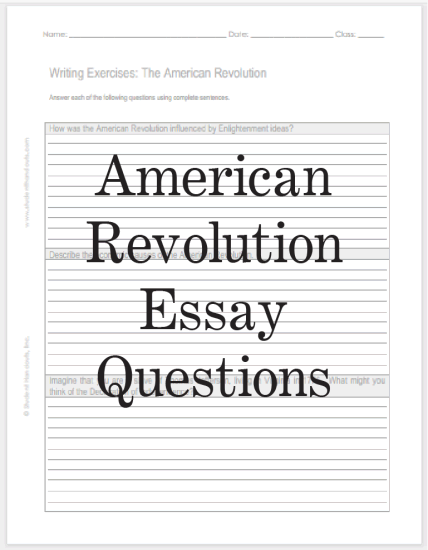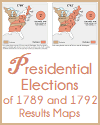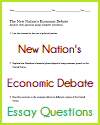| American Revolution Essay Questions |
|---|
| www.studenthandouts.com ↣ U.S. History ↣ American Revolution ↣ American Revolution Worksheets |
 |
   |
|
American Revolution Essay Questions - Click here to print. Answers will vary. 1 How was the American Revolution influenced by Enlightenment ideas? The American Revolution was strongly influenced by Enlightenment ideas such as natural rights, liberty, and government by consent. Thinkers like John Locke inspired colonists to challenge monarchy and advocate for self-rule, individual freedom, and the idea that power comes from the people, not kings. 2 Describe the economic causes of the American Revolution. The economic causes of the American Revolution included British taxation policies that angered colonists, such as the Stamp Act and Tea Act, which imposed taxes without colonial representation. Trade restrictions, like the Navigation Acts, limited economic freedom and favored British interests. These measures hurt colonial merchants and farmers, fueling resentment and calls for independence. 3 Imagine that you are a slave of Thomas Jefferson, living in Virginia in 1776. What might you think of the Declaration of Independence? Students' answers should reflect understanding of the applicability of the declaration to enslaved persons. |
|
Road to Revolution Essay Questions - Click here to print. Answers will vary. 1 Explain the concept of "no taxation without representation." "No taxation without representation" was a slogan used by American colonists to protest British taxes. It meant they believed it was unfair to be taxed by the British Parliament when they had no elected representatives in it. Colonists demanded a voice in decisions affecting their money and rights. 2 Summarize the events of the Boston Massacre. The Boston Massacre occurred on March 5, 1770, when British soldiers fired into a crowd of colonists who were taunting them. Five colonists were killed, including Crispus Attucks. The event heightened tensions between Britain and the colonies and was used by patriots as powerful propaganda to fuel anti-British sentiment and demand for justice. 3 Describe the causes and effects of the Boston Tea Party. The Boston Tea Party was caused by colonial anger over the Tea Act of 1773, which gave the British East India Company a monopoly on tea sales and kept a tax on tea. In protest, colonists disguised as Mohawk Indians dumped 342 chests of tea into Boston Harbor. In response, Britain passed the Coercive Acts (Intolerable Acts), which punished Massachusetts and united the colonies in opposition, moving them closer to revolution. 4 Illustrate the events at Lexington and Concord. The battles of Lexington and Concord on April 19, 1775, marked the start of the American Revolution. British troops marched to seize colonial weapons, but were met by armed militiamen. Shots were fired in Lexington, and fighting intensified in Concord, forcing the British to retreat under heavy colonial fire. Students may opt to answer this with words or by drawing a battle map. It's an opportunity for creativity! 5 How might your life be different had George III accepted the Olive Branch Petition? This is another chance for creative thinking. Would the colonies have remained under British rule? If so, how might life in the U.S. be different? Students will answer well if they understand something of the history of other crown colonies (Canada, Australia), that the British outlawed slavery much earlier than did the U.S., etc. |
|
Revolutionary Ideas Essay Questions - Click here to print. Answers will vary. 1 Why did American colonists resist British imperial policy after 1763? After 1763, American colonists resisted British imperial policy because they felt the new taxes and laws, like the Sugar Act and Stamp Act, were unfair. Britain imposed these measures to help pay for the French and Indian War without colonial consent. Colonists believed these actions violated their rights, especially since they had no representation in Parliament. This led to growing anger, protests, and demands for greater self-government. 2 Describe the Enlightenment concepts that are incorporated into the Declaration of Independence. The Declaration of Independence incorporates key Enlightenment concepts such as natural rights, the social contract, and popular sovereignty. Inspired by philosophers like John Locke, it states that all people have rights to life, liberty, and the pursuit of happiness. It argues that governments exist to protect these rights and must derive their power from the consent of the governed. If a government fails to do so, the people have the right to alter or abolish it. 3 Imagine that you are a colonist living in Philadelphia in 1774. How might you feel about revolution? Explain. Students might be aided by being randomly assigned a "type" of colonist to be. Merchants belonging to the Church of England had different viewpoints from, say, Quakers who were opposed to war entirely. Answers should reflect an understanding that one's economic, ethnic, and religious positions played a role in how a person viewed the revolutionary movement. |
| www.studenthandouts.com ↣ U.S. History ↣ American Revolution ↣ American Revolution Worksheets |














































